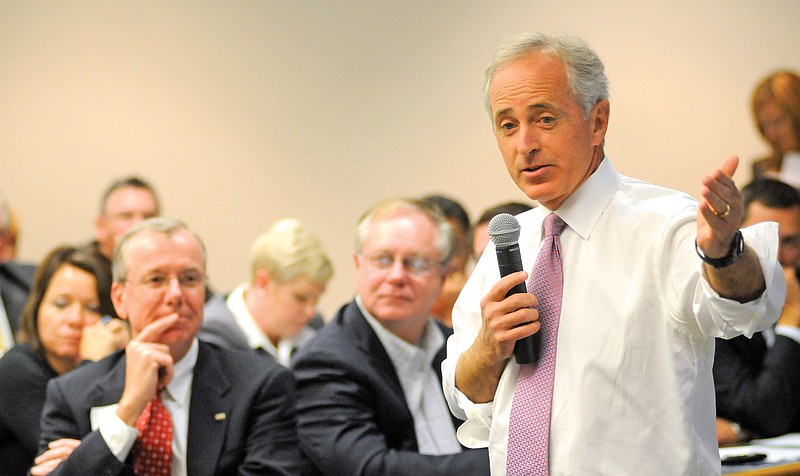As the minutes ticked down Monday to the start of a panel discussion led by U.S. Sen. Bob Corker on housing market reform, the room of 160 Realtors, businessmen and government officials grew silent.
"It's an awfully quiet crowd, I must say," said Corker, R-Tenn., as he took up the microphone and kicked off a forum on The Path to a Strong Real Estate Market.
For those looking for answers to the troubled real estate market, however, the two-hour, mostly free-form discussion raised more questions than solutions.
Panelists seemed reluctant to directly address the issue of what to do with Fannie Mae and Freddie Mac, which together hold about $5 trillion in mortgages and are now under government conservatorship, said Randy Durham, president of the Chattanooga Association of Realtors.
"At least they are engaging the community in the dialogue and the discussion," Durham said. "However, there are a lot of issues that really weren't discussed about what it's going to take to get back to a healthy real estate market."
Durham blamed subprime lending, which was underwritten to a large degree by the government-backed mortgage giants, for the financial meltdown. He said regulators should not lose sight of the fact that "we did this right for a longer number of years than we did it wrong."
The panelists acknowledged that the current system, under which foreclosures continue to rise while home sales have stagnated, hasn't worked as it should.
"In the past decade, we've seen a home-ownership-at-any-cost model, which hasn't worked," said Raphael Bostic, assistant secretary for policy development and research at the U.S. Department of Housing and Urban Development.
His suggestion for improvement was to create a system of regulation that's "nimble, requiring less specificity now and more flexibility moving forward."
But Corker, along with some audience members, questioned why the nation needs more power in the hands of regulators and government agencies. Even panelists with government ties said that the current level of government involvement is counterproductive.
"It's very important to try and resolve what the future will look like, because running Fannie and Freddie as conservatorships is very difficult," said Patrick Lawler, chief economist at the Federal Housing Finance Agency.
Corker said later that government's involvement is "over the top."
"You've got the government insuring these mortgages, you've got the government purchasing pools of mortgage-backed securities, and now even the Fed is purchasing mortgage-backed securities that have already been insured by the federal government," he said.
Bostic, however, criticized what he called the "false dichotomy" of free-market enterprise versus government intervention, and several panelists theorized that the free market would be unable to immediately pick up the trillions of dollars in slack left behind if Fannie Mae and Freddie Mac were eliminated.
"You must have a third party with a set of rules, that's the government. Otherwise it's a Wild West situation," Bostic said.
Though there were few solutions offered to fixing the current system, other than increasing transparency and educating homebuyers, Corker said he intends to conduct more forums in Nashville and Memphis with different panelists to "understand this issue fully, backwards and forwards," before he authors any legislation.
"In the room today you had a lot of different types of people, some vested interests, and it's complex," Corker said. "I believe this is actually going to be a more difficult task to get right in some ways than even financial regulation that was just passed."

